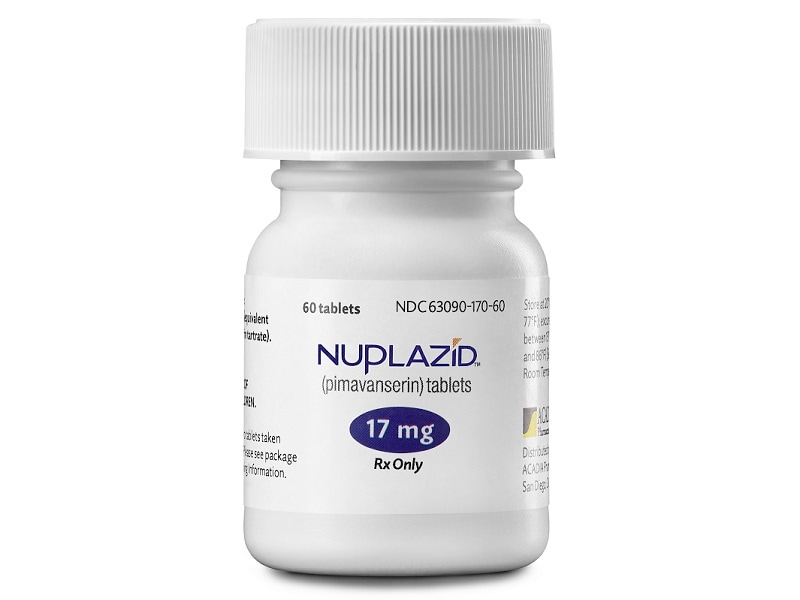EDITORS' RECOMMENDATIONS
RELATED DRUGS & DISEASES
Topline, phase 2 trial results with the antipsychotic drug pimavanserin (Nuplazid, Acadia Pharmaceuticals) in patients with Alzheimer's disease (AD) psychosis showed a statistically significant reduction in psychosis among those taking pimavanserin vs placebo, the company has announced.
A selective serotonin inverse agonist preferentially targeting 5-HT2A receptors, pimavanserin has a different biological mechanism than other antipsychotics.
Earlier this year, the US Food and Drug Administration (FDA) approved pimavanserin tablets for the treatment of hallucinations and delusions associated with psychosis in Parkinson's disease (PD).
The new double-blind, placebo-controlled exploratory trial included 181 patients with AD psychosis in the United Kingdom (mean age, 86 years). These patients were randomly assigned to receive 34 mg of pimavanserin or placebo daily.
The primary endpoint was antipsychotic efficacy, as measured by the mean change in the Neuropsychiatric Inventory-Nursing Home (NPI-NH) Psychosis score (combined hallucinations and delusions domains) from baseline to week 6 of dosing. Patients continued dosing to week 12 to provide information on secondary endpoints, including changes in cognition.
At week 6, patients taking pimavanserin had a 3.76-point improvement in the NPI-NH Psychosis score compared with a 1.93-point improvement for placebo, representing a statistically significant (P = .0451) comparative improvement. Baseline mean scores were 9.52 and 10.00 for the pimavanserin and placebo groups, respectively.
Atypical antipsychotics have been associated with worsening of cognitive function in patients with AD. Over the course of 12 weeks of treatment in the current study, pimavanserin did not impair cognition as measured by the Mini-Mental State Examination score and was similar to placebo.
On the secondary endpoint of mean change in NPI-NH Psychosis score at week 12, pimavanserin maintained the psychosis improvement seen at the week 6 primary endpoint. This, however, did not statistically separate from placebo.
Pimavanserin was generally well tolerated, and the safety profile was consistent with that reported in previous studies. A preliminary analysis of safety data found that the most common adverse events were falls, urinary tract infection, and agitation. The mortality rate was similar in two study groups.
In the earlier PD trial, the effectiveness of pimavanserin was shown in a 6-week clinical trial of 199 participants. That study showed the drug to be superior to placebo in decreasing the frequency and/or severity of hallucinations and delusions without worsening the primary motor PD symptoms.
Hallucinations or delusions occur in as many as 50% of patients with PD at some time during the course of their illness and can be profoundly disturbing and disabling, according to experts in the field.
Despite some concerns about an increased risk for severe adverse events, including death, and the small number of patients tested, members of the FDA's Psychopharmacologic Drugs Advisory Committee had determined that Acadia had shown its drug to be effective and safe in patients with PD and that its benefits outweigh the risks.
As with other atypical antipsychotic drugs, pimavanserin has a boxed warning alerting healthcare professionals about an increased risk for death associated with the use of these drugs to treat older people with dementia-related psychosis.
Pimavanserin was granted breakthrough therapy designation for the treatment of hallucinations and delusions associated with PD. According to the FDA, this designation is designed to expedite the development and review of drugs that are intended to treat a serious condition and for which preliminary clinical evidence indicates that the drug may demonstrate substantial improvement over available therapy on a clinically significant endpoint.
The drug was also granted a priority review, which provides for an expedited review of drugs that offer a significant improvement in the safety or effectiveness for the treatment, prevention, or diagnosis of a serious condition.
"Alzheimer's disease patients suffer from a number of debilitating symptoms, of which psychosis carries a poor prognosis and is associated with earlier placement into nursing homes," said Steve Davis, Acadia's president and chief executive officer, in a press release.
The new data, he said, "provide solid evidence that pimavanserin can improve psychosis in another major neurological disorder and provide strategic momentum for the further development of pimavanserin to address the needs of AD psychosis patients."

No comments:
Post a Comment